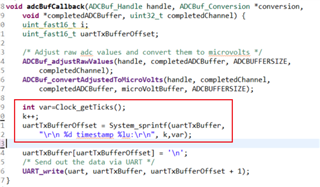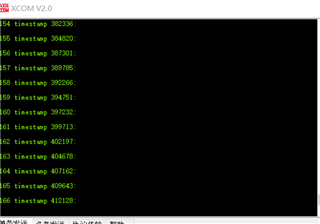Part Number: CC2650
Other Parts Discussed in Thread: SYSBIOS
TI engineer,
I tried the example “adcbufcontinuous_CC2650_LAUNCHXL_TI”, I set the “adcBufParams.samplingFrequency = 1000;” and “#define ADCBUFFERSIZE (25)”. And I add some code in ADC callback function to print the time stamp, as the picture.

The callback function should be executed every 25ms, however the timestamp it prints show it executes every 24.85ms.

I was really confused why the time is less than 25ms,since 25*0.001=0.025s.


